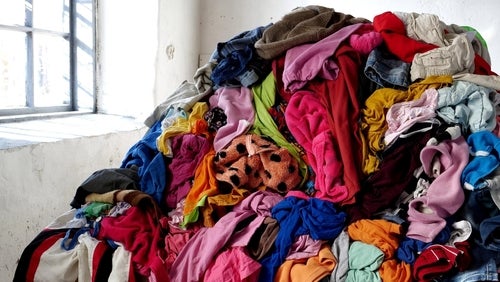
The EU Parliament on Wednesday [12 July] agreed on its negotiating position for talks with EU governments on a new law to make products in the EU more sustainable.
The EU’s Ecodesign Mandate: An overview
In its negotiating mandate, MEPs strengthen the measures proposed by the Commission to ensure longer product lifespans and better-informed consumers.
Specifically, the mandate calls for product lifetimes to not be limited through design features, accessibility to spare parts for an “appropriate period, and a product passport with accurate and up-to-date information to increase transparency and enable consumers to make informed purchasing choices.
Rapporteur Alessandra Moretti (S&D, IT) said: “It’s time to end the ‘take, make, dispose’ model which is so harmful to our planet, our health and our economy. This law will ensure that new products are designed in a way that brings benefits to everyone and which respects our planet’s boundaries and protects the environment. Sustainable products will become the norm, allowing consumers to save energy, make repairs easier, and make smart environmental choices when they shop – saving themselves money in the long run.”
Euratex, along with The Federation of European Sporting Goods Industry (FESI), was again part of the industry trade bodies taking aim at the negotiating mandate ahead of parliament commencing talks with national governments on the final form of the law.

US Tariffs are shifting - will you react or anticipate?
Don’t let policy changes catch you off guard. Stay proactive with real-time data and expert analysis.
By GlobalDataConcerns over contradictions to other EU legislation
FESI said while it applauded the European Parliament’s efforts in recognising the importance of ecodesign requirements and their potential impact on sustainability and environmental responsibility within the industry, there were concerns around its stance on certain provisions related to the ban on the destruction of unsold goods.
“While preventing the destruction of suitable goods is important, FESI believes that the current scope of the proposed ban lacks clarity. FESI advocates for specific derogations for certain types of goods, in line with the objectives of other legislative proposals currently on the table. If we want to scale up the amount of recycled and recyclable materials in the EU, then recycling should for example not be considered as ‘destruction’ as this may lead to misalignment with other EU legislation, such as the waste hierarchy enshrined in the Waste Framework Directive or the objectives of the EU Textile Strategy on textile-to-textile recycling.”
Jérôme Pero, secretary general of FESI, added: “We welcome the Parliament’s work on providing further clarification linked to the ban on unsold goods, in particular, regarding the reporting obligations and the list of exemptions, with the inclusion of counterfeit products. However, we regret that products not allowed to be placed on the market due to contractual obligations were not included.”
Commenting on the significance of safeguarding intellectual property, protecting confidential business information to foster innovation and promoting regional competitiveness, FESI said it was “concerned” about the potential implications of reporting requirements on this adding it is necessary to strike a balance between preserving business secrets and ensuring transparency.
FESI also called for strengthened enforcement and a level playing field for all that comply with the proposal while placing products on the EU market regardless of the sales channel they employ.
Meanwhile, The European Apparel and Textile Confederation (EURATEX) in general welcomed the framework saying it is “based on an inclusive and feasible approach, ensures sufficient capacity and sets a timeline for businesses to adjust.”
“Strongly advocated by Euratex, the European Parliament also strengthens the provisions on market surveillance, which is a key element for ensuring level playing field for EU companies in the Single Market.
Challenges for SMEs, missed opportunities
“As businesses already face difficulties to navigate through all ongoing policy and legislative initiatives, Euratex appreciates the efforts of the EP to ensure legislative consistency, the lack of which may only create additional costs and administrative burdens for companies. The inclusivity and transparency of the future Ecodesign Forum have indeed received a positive boost.”
However, Euratex noted the framework overlooked a plea for legislative coherence on substances of concern and that it kept the ESPR aligned with existing chemical legislation to avoid overlapping or conflicting regulations.
It added social sustainability aspects should be addressed within the framework of due diligence legislation and stressed the importance of reliable data, thorough analysis, and impact assessments when developing textile-specific Ecodesign requirements which should be outlined in the textile-specific Delegated Act and developed in collaboration with relevant stakeholders.
And it pointed out that the European Parliament’s position on Industrial Emissions Directive was adopted by MEPs with 396 votes in favour, 102 against and 131 abstentions.
“Euratex expresses concerns on this text because of the inclusion of standalone finishing plants in the scope of the new IED. This creates inconsistencies with the recently finalised Textile BREF document (adopted in Sevilla by all parties), which regulates industrial emissions for both pretreatments and finishing plants. Standalone finishing companies, typically SMEs, now face challenges to comply with specifications which were originally designed for different and bigger companies.”



